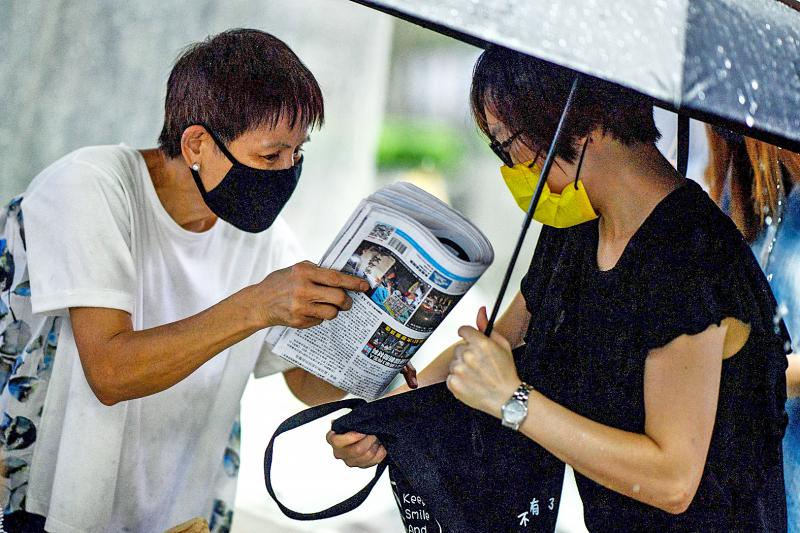Hong Kong cyberactivists are backing up articles by pro-democracy tabloid Apple Daily on censorship-proof blockchain platforms after the newspaper was forced to shut down as it became embroiled in a National Security Law crackdown.
The latest drive to preserve the paper’s content comes after advocates rushed to upload documentaries by Radio Television Hong Kong (RTHK) investigating people in power after the media outlet said that it would remove materials older than one year from its social media platforms.
Under the national security legislation, the Hong Kong government can request the blocking or removal of content it deems subversive or secessionist, raising fears over Internet freedom in the territory.

Photo: AFP
The Hong Kong government has said that use of the Internet would not be affected so long as its use was within the law.
“Law enforcement actions taken by Hong Kong law enforcement agencies are based on evidence, strictly according to the laws of Hong Kong, and for the acts of the person(s) or entity(ies) concerned,” a Hong Kong National Security Bureau spokesman said in a statement.
This year, the firm that approves Internet domains in Hong Kong said that it would reject any sites that could incite “illegal acts.”
Internet service provider Hong Kong Broadband Network said that it had blocked access to HKChronicles, a Web site offering information about democracy protests.
Fearing the national security legislation could bring elements of China’s “Great Firewall” to Hong Kong, limiting access to dissenting views, 21-year-old Ho — who works in tech and did not give his first name because of the sensitivity of the matter — began this week to upload Apple Daily articles on decentralized file storage platform ARWeave.
After midnight, as the printers ran one final time, Apple Daily shut off its Web site and erased all of its social media platforms after authorities froze company-related assets as part of a national security probe.
“I’m not doing this because I love Apple Daily. It’s what needs to be done,” Ho said. “I never thought that Apple Daily would disappear so quickly.”
Police had frozen assets of companies linked to Apple Daily and last week arrested five executives, moves that led to the newspaper printing its final edition yesterday.
Authorities said that dozens of Apple Daily articles might have contravened the national security legislation, but there was no suggestion that Apple Daily content would be blocked or censored.
Similar to BitTorrent, ARWeave breaks down a file into bits of information distributed over an open network of anonymous computers around the world.
On its Web site, it describes itself as a “collectively owned hard drive that never forgets.”
As of yesterday, more than 4,000 Apple Daily articles had been uploaded on ARWeave. Hundreds of RTHK programs dating back to 2012 are also available.
Another programmer, Kin Ko (高重建), 47, has been building a decentralized registry called LikeCoin.
Ko’s initial idea was to create a platform that could authenticate any type of content, and did not expect it to be embraced so enthusiastically by democracy advocates.
However, he said that “history must not be determined by those in power.”

MONEY GRAB: People were rushing to collect bills scattered on the ground after the plane transporting money crashed, which an official said hindered rescue efforts A cargo plane carrying money on Friday crashed near Bolivia’s capital, damaging about a dozen vehicles on highway, scattering bills on the ground and leaving at least 15 people dead and others injured, an official said. Bolivian Minister of Defense Marcelo Salinas said the Hercules C-130 plane was transporting newly printed Bolivian currency when it “landed and veered off the runway” at an airport in El Alto, a city adjacent to La Paz, before ending up in a nearby field. Firefighters managed to put out the flames that engulfed the aircraft. Fire chief Pavel Tovar said at least 15 people died, but

LIKE FATHER, LIKE DAUGHTER: By showing Ju-ae’s ability to handle a weapon, the photos ‘suggest she is indeed receiving training as a successor,’ an academic said North Korea on Saturday released a rare image of leader Kim Jong-un’s teenage daughter firing a rifle at a shooting range, adding to speculation that she is being groomed as his successor. Kim’s daughter, Ju-ae, has long been seen as the next in line to rule the secretive, nuclear-armed state, and took part in a string of recent high-profile outings, including last week’s military parade marking the closing stages of North Korea’s key party congress. Pyongyang’s official Korean Central News Agency (KCNA) released a photo of Ju-ae shooting a rifle at an outdoor shooting range, peering through a rifle scope

South Korea would soon no longer be one of the few countries where Google Maps does not work properly, after its security-conscious government reversed a two-decade stance to approve the export of high-precision map data to overseas servers. The approval was made “on the condition that strict security requirements are met,” the South Korean Ministry of Land, Infrastructure and Transport said. Those conditions include blurring military and other sensitive security-related facilities, as well as restricting longitude and latitude coordinates for South Korean territory on products such as Google Maps and Google Earth, it said. The decision is expected to hurt Naver and Kakao

Gaza is rapidly running out of its limited fuel supply and stocks of food staples might become tight, officials said, after Israel blocked the entry of fuel and goods into the war-shattered territory, citing fighting with Iran. The Israeli military closed all Gaza border crossings on Saturday after announcing airstrikes on Iran carried out jointly with the US. Israeli authorities late on Monday night said that they would reopen the Kerem Shalom crossing from Israel to Gaza yesterday, for “gradual entry of humanitarian aid” into the strip, without saying how much. Israeli authorities previously said the crossings could not be operated safely during